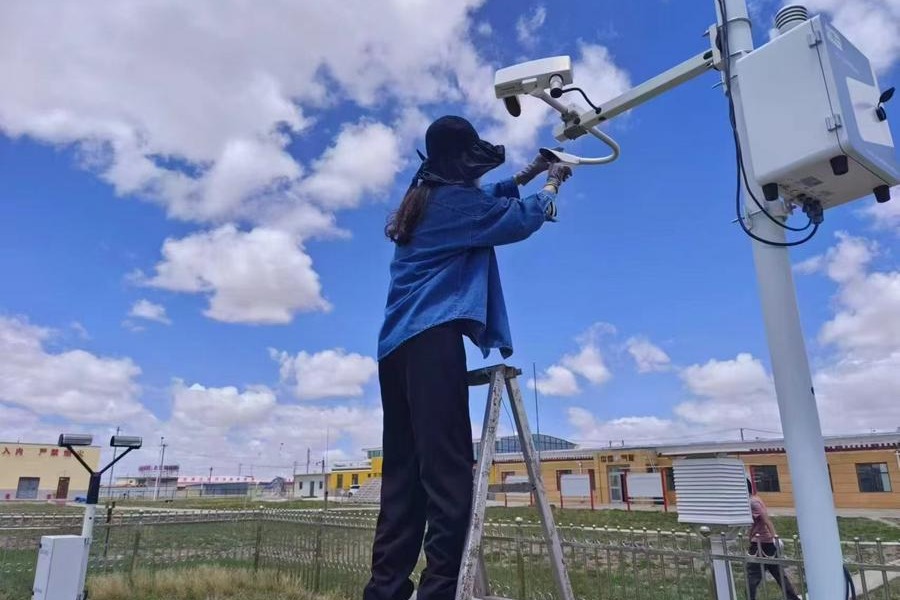China gains momentum in sci-tech breakthroughs

China has achieved a series of recent breakthroughs in scientific frontiers such as quantum physics and artificial intelligence, attracting widespread global attention, and the momentum is expected to increase as the nation strives to become a major science and innovation center.
Xue Qikun, an academician at the Chinese Academy of Sciences who received the top national science and technology award on Monday, said, "The country's economy is in a period of rapid development, and the support for higher education, scientific research and talent is, in my opinion, the best in history."
In recent years, breakthroughs by Chinese scientists have included the brain-like Tianmoc computer chip, which mimics how the human visual system processes information and will enhance the response speed and security of artificial intelligence; development of a quantum experimental system that is expected to propel advancements in quantum physics research and quantum computing; and discovery of key evidence of the existence of nanohertz gravitational waves — the "ripples" produced by massive objects in space such as black holes — by using China's Five-hundred-meter Aperture Spherical Radio Telescope.
Such achievements were made possible, observers said, by China's top leadership with President Xi Jinping at its core, which played a heralding role in the drawing up and implementing of the nation's science and technology development blueprint and enabled scientists like Xue to witness the once unimaginable become reality.
In his report to the 20th National Congress of the Communist Party of China in October 2022, Xi, who is also general secretary of the Communist Party of China Central Committee and chairman of the Central Military Commission, said, "If China wants to be strong and prosperous, it must vigorously develop science and technology and strive to become a major scientific center and innovation center in the world."
Building a modern socialist power in an all-around way as scheduled will depend on scientific and technological self-reliance, he emphasized.
Innovation in science and technology has become increasingly crucial, and the competition increasingly fierce, he added.
Xue, also president of Southern University of Science and Technology in Shenzhen and a professor at Tsinghua University, said he believes that China's fundamental research is at its best developmental stage ever.
"In the scientific frontiers yet to be explored by humanity, Chinese scientists have great potential," he said. "We must seize major research opportunities continuously and focus on tackling key issues in quantum technology."
President Xi said on Monday in Beijing, while presenting medals and certificates to the recipients of the top Chinese sci-tech award, that "a nation thrives when its science and technology thrive, and a strong science and technology sector makes a strong nation".
He also stressed that science and technology hold a strategic leading position and play a fundamental supporting role, when he set out his vision at the event on Monday to build China into a strong nation in science and technology by 2035 and called for high-level technological self-reliance and self-improvement.
China's research and development funding increased from 1.03trillion yuan ($142 billion) in 2012 to 3.3 trillion yuan last year, with research and development spending accounting for 2.64 percent of GDP, which surpassed the average level of that in the European Union.
The country's expenditure on basic research increased 9.3 percent last year, with the proportion of investment in basic research exceeding 6 percent for five consecutive years.
According to data from the National Intellectual Property Administration, as of the end of last year, China's number of granted invention patents exceeded 4 million, ranking first in the world.
"Among these over 4 million effective invention patents, high-value patents account for over 40 percent," said Hu Wenhui, deputy head of the NIPA.
For example, Gao Xiang, an academician of the Chinese Academy of Engineering, and his team lowered pollution emissions from ships, and their systems have been certified by nine major global classification societies, including those in the United States and the United Kingdom. The team's systems have been applied to nearly 500 vessels of renowned shipping companies worldwide, making it the largest supplier globally in its category.
"In the first half of this year, our team's ship emission purification systems secured 40 percent of global orders in the maritime industry, with orders from overseas companies such as Mediterranean Shipping accounting for 90 percent of the total," said Gao, who is dean of Zhejiang University's School of Energy Engineering.
He said he believes that this not only promotes the development of clean and low-carbon ship technologies worldwide, but also provides crucial technological support for China to become a leading nation in ship manufacturing and green shipping.
Seizing the opportunities created by the green and high-tech transition has long been regarded by President Xi as the key to China achieving high-quality development.
When chairing the 36th group study session of the Political Bureau of the 19th CPC Central Committee, he said China must seize the opportunities of the new round of scientific and technological revolution and industrial transformation, while promoting in-depth integration of emerging technologies such as the internet, big data, artificial intelligence and 5G with green and low-carbon industries.
Chinese scientists have made various such achievements, and the number of China's academic papers published in the 159 most influential journals accounted for over 30 percent of the total in 2022, surpassing the US for the first time to claim the top spot globally, according to the China Institute of Scientific and Technical Information.
Ma Yanqing, a specially appointed professor at the School of Physics in Peking University who has received the 2024 Tan Kah Kee Young Scientist Award, said, "If everyone digs deep in their own field of interest, then viewing the scientific community as a whole, in five to 10 years, many peaks and breakthroughs are expected to emerge within this collective."
- China revises regulations on protection of new plant varieties
- China launches mandatory audits to bolster personal information protection
- Delivering social benefits
- Shenzhou XIX crew returns safely to 'beautiful, blue' Earth
- Ordinary work, extraordinary workers
- AI agent to improve international law services in Shanghai





































